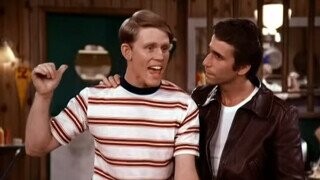Ron Howard Did ‘Happy Days’ to Avoid the Draft

Too old to be Opie but too young to be a man, early 1970s Ron Howard was at a crossroads. Sure, he had a few acting prospects, but he also held something else: A lousy draft number, meaning his odds of getting dragged into the Vietnam War were high. Howard did, however, have one possible out.
“I had read somewhere that if your job could be directly related to the employment of 30 or more people, that would be a deferment,” Howard told The Washington Post in 1984, as reported by MeTV. “I thought, ‘If this series goes, I bet you could get that deferment.’”
If only Howard was the guy to give new sitcoms the greenlight. ABC wasn’t too sure about “this series” Happy Days, a sweet, 1950s nostalgia fest conceived at a time when edgy comedies like All in the Family, Sanford and Son and M*A*S*H topped the ratings. "ABC didn't feel that the '50s would fly,” Howard admitted.
Don't Miss
That all changed when Howard appeared in American Graffiti, a similarly themed movie comedy that proved to be a hit at the box office for Howard and young director George Lucas. Proof of concept, ABC! Let’s go!
Suddenly, Happy Days was given the go-ahead and Howard was the star of a hot show that surely employed at least 30 — but it didn’t matter. Just a few months after the show was given the Fonzie thumbs-up, the draft ended for Howard and everyone else holding a lousy number.
The show would go on for eleven seasons, but Howard didn’t stick around for the entire run. Ironically, his character Richie Cunningham was no longer eating at Arnolds because he enlisted in the Army.
Ralph Malph and Richie were stationed in Greenland, which was the show’s way of saying Howard was tired of playing an eternal teenager. Instead, Warner Brothers drafted Howard to direct Night Shift, a comedy starring his old pal, Henry Winkler.
“(Happy Days) will always be a part of the way I'm perceived, and in a way it gives me an opportunity to surprise people — and people like to be surprised,” he said while promoting his first feature. “I learned a lot about comedy from Happy Days, from doing it in front of an audience and learning timing and rhythm, hearing the laughs. And I was able to leverage it into directing work.”